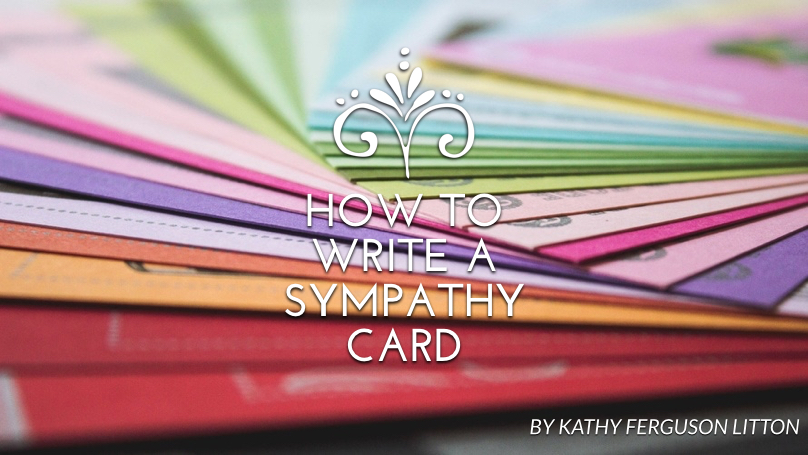The pen is in your hand, the card opened and yet you are paralyzed. What should you say to recognize loss? We truly do want to say something meaningful. Yet we are writing to a fragile heart. Most of us are wise enough to realize we have potential to help or hurt in this small but important gesture.
Honor their pain.
This is the MOST important mindset of giving care to a hurting person. Ironically a well-meaning goal is to move them past their hurt, which unknowingly creates more pain. We are uncomfortable with grief and we want fix things. Grief is the emotional suffering one feels when something or someone is taken away. Every step of the process is natural and healthy. Our language can suggest they need to move through their pain swiftly. Listen to what we say: “Your loved one is in heaven.” or “You will see them again.” Truth, yet the timing of these reminders will not resolve their present hurt. There is a time for hope and comfort but let them grieve first. Honor their pain.And most importantly give them permission to hurt. Remember Job’s friends as they offered truth yet without thoughtful timing. Plain and simple, open with some version of: “I am very sorry for your loss.”
Honor their loved one.
Simply recognize the person they have lost from the perspective you knew them. Or if you did not know them from the perspective THEY knew them. “Your husband loved you deeply.” “I taught your son, he was such a bright light in my class.” Or something more general, “It is hard to say goodbye to our loved ones.”
Remember your own pain.
(But you shouldn’t necessarily talk about it.) Empathize from your own journey in losses. Remember how it felt. Frame your response from your own broken heart, Yet they do not need to hear your entire story. You can dip back into your experience without relaying a lengthy narrative.
Do not offer advice.
This is not the time to give counsel for the circumstances of their lives. If it is a medical crisis or death please do not recommend experts. This is a time to comfort not instruct. If you have a book that is helpful for them, let some time pass then send it to them.
Do offer help.
Express your concern but also recognize they have real needs in their loss. Offering to meet those needs may unburden their lives. “Can we bring a meal?” or “Let us come by and get your kids for a few hours.” “Our small group wants to take care of your yard for the next six months.” Give helpful help. Be specific and then follow through. A powerful reminder of your prayer support is always encouraging. Include a piece of scripture that you will be praying for them. Knowing the body is lovingly praying is huge gift to grievers.
Give them hope.
A simple reminder of the reality of God or truth from scripture is helpful. Yet proceed with thoughtful, caution at this moment to recognize the complexities of their hearts. Yes, “God is good all the time.” is true but in losses it may feel untrue. This is a time that MUCH untruth about God is dispensed. (“God will never give you more than you can bear.”is NOT scripture.) Point them to eternal truths regarding hope and the faithfulness of God.
We have this hope as an anchor for our soul, both sure and steadfast… Hebrews 6:19
God is our refuge and strength, an ever-present help in a time of trouble. Therefore we will not fear though the earth give way and the mountains fall into the sea. Psalm 46: 1-2
A sympathy card may seem like a small gesture, but trust me, it is powerful. Don’t think it too small. When I was widowed I received sympathy hundreds of cards, from all walks of life, from great leaders, deep friends, even from the White House. Yet I still have one taped inside my Bible from a Hispanic family that attended our church I didn’t even know. Their words were particularly comforting to me. Don’t underestimate how God might use your words.
What advice for showing support during loss would you add?
Published September 5, 2016



